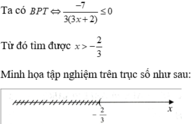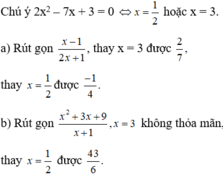Cho x +1/x=3. Tính giá trị a)A= x2 +(1/x)2
Hãy nhập câu hỏi của bạn vào đây, nếu là tài khoản VIP, bạn sẽ được ưu tiên trả lời.


a) A = (x - 5)(x² + 5x + 25) - (x - 2)(x + 2) + x(x² + x + 4)
= x³ - 125 - x² + 4 + x³ + x² + 4x
= (x³ + x³) + (-x² + x²) + 4x + (-125 + 4)
= 2x³ + 4x - 121
b) Tại x = -2 ta có:
A = 2.(-2)³ + 4.(-2) - 121
= 2.(-8) - 8 - 121
= -16 - 129
= -145
c) x² - 1 = 0
x² = 1
x = -1; x = 1
*) Tại x = -1 ta có:
A = 2.(-1)³ + 4.(-1) - 121
= 2.(-1) - 4 - 121
= -2 - 125
= -127
*) Tại x = 1 ta có:
A = 2.1³ + 4.1 - 121
= 2.1 + 4 - 121
= 2 - 117
= -115

\(a,ĐK:x\ne\pm2\\ A=\dfrac{4x-8+2x+4-5x+6}{\left(x-2\right)\left(x+2\right)}=\dfrac{x+2}{\left(x-2\right)\left(x+2\right)}=\dfrac{1}{x-2}\\ ĐK:x\ne-1;x\ne-2\\ B=\dfrac{x+1}{\left(x+1\right)\left(x+2\right)}=\dfrac{1}{x+2}\\ b,x^2+x=0\Leftrightarrow\left[{}\begin{matrix}x=0\left(tm\right)\\x=-1\left(tm\right)\end{matrix}\right.\\ \forall x=0\Leftrightarrow A=\dfrac{1}{0-2}=-\dfrac{1}{2}\\ \forall x=-1\Leftrightarrow A=\dfrac{1}{-1-2}=-\dfrac{1}{3}\)
\(x^2+2x=0\Leftrightarrow\left[{}\begin{matrix}x=0\left(tm\right)\\x=-2\left(ktm\right)\end{matrix}\right.\Leftrightarrow x=0\\ \Leftrightarrow B=\dfrac{1}{0+2}=\dfrac{1}{2}\)

a. \(A=\dfrac{1}{x-1}-\dfrac{1}{x+1}+\dfrac{4x+2}{x^2-1}\)
\(A=\dfrac{x+1}{\left(x-1\right)\left(x+1\right)}-\dfrac{x-1}{\left(x-1\right)\left(x+1\right)}+\dfrac{4x+2}{\left(x-1\right)\left(x+1\right)}\)
\(A=\dfrac{\left(x+1\right)-\left(x-1\right)+4x+2}{\left(x-1\right)\left(x+1\right)}\)
\(A=\dfrac{x+1-x+1+4x+2}{\left(x-1\right)\left(x+1\right)}\)
\(A=\dfrac{4x+4}{\left(x-1\right)\left(x+1\right)}=\dfrac{4\left(x+1\right)}{\left(x-1\right)\left(x+1\right)}=\dfrac{4}{x-1}\)
b) Ta có: \(A=\dfrac{4}{x-1}=\dfrac{4}{2015}\) (ĐK: \(x\ne\pm1\) )
\(\Leftrightarrow8060=4\left(x-1\right)\)
\(\Leftrightarrow8060=4x-4\)
\(\Leftrightarrow8064=4x\)
\(\Leftrightarrow x=\dfrac{8064}{4}=2016\left(tm\right)\)
c) Ta có: \(\dfrac{4}{x-1}\left(x\ne1\right)\)
Để \(\dfrac{4}{x-1}\) nhận giá trị nguyên thì \(4:\left(x-1\right)\Leftrightarrow x-1\in\text{Ư}\left(4\right)=\left\{1;4;2\right\}\)
Vậy với x ∈ {2; 5; 3; 0; -1; -3} thì biểu thức \(\dfrac{4}{x-1}\) nhận giá trị nguyên
d) Thay \(x=-\dfrac{1}{2}\) vào biểu thức A ta được:
\(\dfrac{4}{-\dfrac{1}{2}-1}=-3\)
Vậy biểu thức A có giá trị -3 tại \(x=-\dfrac{1}{2}\)

a: \(A=x^3-27-x^3+3x^2-3x+1-4\left(x^2-4\right)-x\)
\(=3x^2-4x-26-4x^2+16\)
\(=-x^2-4x-10\)


ta có \(x+\frac{1}{x}=3=>\left(x+\frac{1}{x}\right)^2=3^2\)
\(< =>x^2+2.x.\frac{1}{x}+\frac{1}{x^2}=9\)
\(< =>x^2+2+\frac{1}{x^2}=9\)
\(< =>x^2+\frac{1}{x^2}=9-2\)
\(< =>x^2+\frac{1}{x^2}=7\)